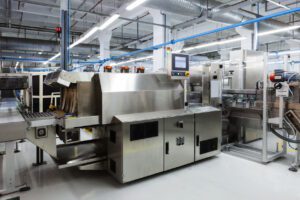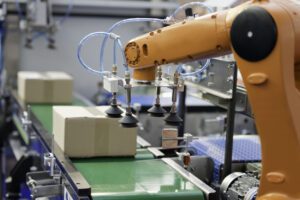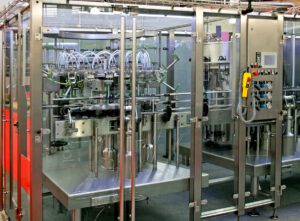Equipment leasing can be a game-changer for small businesses, particularly those companies looking for a competitive edge over their competition, companies just starting or looking to expand. Here are some reasons why.
Benefits of an Equipment Lease
Cost savings
Equipment leasing enables small businesses to acquire the necessary equipment without incurring the high upfront costs of purchasing or another equipment financing. Leasing typically involves 100% financing with smaller, manageable payments spread over a predetermined period, freeing up financial resources for other business needs. Business loans for equipment are often structured at or less than 80% of the loan to value ratio for the equipment.
Flexibility
An equipment lease allows small businesses to remain flexible in their equipment needs as they grow or evolve. This is especially beneficial in industries with rapidly changing technology, as it enables the businesses to transfer the obsolescence risk to the lessor or replace equipment as needed without committing to long-term ownership.
Tax benefits
Leasing can offer potential tax benefits for small businesses. Lease payments may be tax-deductible, which can help to reduce the overall tax burden on the business.
Preservation of credit
Leasing equipment does not require the same level of credit commitment as purchasing, which can be a significant advantage for small businesses with limited personal credit or resources. Leasing can also help businesses to preserve their credit lines, which can be critical for future borrowing needs.
Maintenance and repairs
With equipment leasing, the total cost of ownership and downtime is significantly reduced because the equipment is consistently refreshed with new technology.
In summary, equipment leasing can be an excellent financial solution for small businesses looking to acquire the necessary equipment while maximizing their cash flow, and preserving cash and credit lines.
By leasing equipment, small businesses can remain agile and competitive in their industries while minimizing financial risk and maximizing potential tax benefits.

What is equipment leasing?
Equipment leasing is an equipment financing option where businesses rent equipment from a leasing company for a fixed period.
Instead of buying expensive equipment upfront, the business can lease it for a fraction of the cost, allowing them to operate at a higher level without draining its financial resources.
The leasing company maintains ownership of the equipment and provides the equipment for use by the lessee.
After the lease period ends, the lessee can purchase the equipment, extend the lease or return the equipment.
The importance of equipment leasing for small businesses
Equipment leasing is a crucial strategy for small businesses to help them overcome financial challenges while gaining the necessary equipment.

How do I decide whether equipment leasing is the best solution for me?
Several factors must be considered when deciding whether equipment leasing is the best solution for your business. Here are some key questions to ask yourself:
How much equipment do I need?
If your business requires significant equipment and or you need flexibility to quickly and efficiently remove and replace assets, leasing is typically far more cost-effective than purchasing.
However, purchasing may be a more cost-effective solution in the long run if you do not need to solve for asset flexibility, transfer of obsolescence risk, transfer of tax benefits, and no constraints on cash or budget.
How frequently will I use the equipment?
If you require equipment for a short-term project or occasional use, leasing may be a better option than purchasing, which can be costly for equipment that is not used frequently.
How quickly does the equipment become obsolete?
If you are in an industry where technology is rapidly evolving, leasing may be a better option than purchasing, as it enables you to upgrade to newer equipment as needed.
However, purchasing may be a better option if your needed equipment has a long lifespan and does not require frequent upgrades.
How much capital do I have available?
Leasing can be more attractive for businesses with limited capital, as it does not require a large upfront investment.
However, if you have the capital available and can purchase the equipment outright, you may save money in the long run by avoiding lease payments and interest expense charges.
What are the tax implications of leasing vs. purchasing?
Leasing can offer potential tax benefits, as lease payments may be tax-deductible. However, purchasing can also offer tax benefits, such as depreciation deductions.
It's important to consult an equipment leasing advisor or tax professional to determine which option is most advantageous for your business.
Considering these factors and weighing the pros and cons of leasing vs. purchasing, you can decide whether equipment leasing is the best solution for your business.
Ultimately, the decision will depend on your unique circumstances and financial goals.

How do I analyze the cost/benefit of an equipment lease vs. a direct purchase?
Analyzing the cost/benefit of equipment leasing vs. a direct purchase involves comparing the net present value of the after-tax cash flows for each option's total costs and benefits over the life of the equipment.

Here are the key steps involved:
Calculate the total cost of leasing
This includes the total lease payments over the life of the lease, any upfront costs or fees, and any end-of-lease costs or additional fees (such as a buyout option or return fees).
Calculate the total cost of purchasing
This includes the upfront cost of the equipment, any financing costs (such as the interest rate on a loan), and any maintenance or repair costs over the life of the equipment.
Estimate the economically useful life of the equipment
This will depend on the type of equipment and how frequently it is used. This estimate will be used to calculate the cost per year of each option.
Consider the tax implications
Leasing may offer tax benefits, such as deducting lease payments as a business expense. Purchasing may also offer tax benefits, such as depreciation deductions.
Compare the total costs of each option
Once you have calculated the total costs of leasing and purchasing over the economically useful life of the equipment, compare the two figures to determine which option is more cost-effective.
Consider the intangible benefits
In addition to cost, there may be intangible benefits to leasing or purchasing, such as the flexibility to upgrade equipment or use the capital for other strategic business needs.
By following these steps and carefully considering the costs and benefits of each option, you can make an informed decision about whether to lease or purchase equipment for your business.
It's important to remember that the best option may vary depending on your specific circumstances and financial goals.
Consulting with an equipment leasing advisor or accountant can also help make this decision.
What should I consider when choosing equipment leasing companies for my equipment lease needs?
Several factors must be considered when choosing equipment leasing companies for your equipment lease needs.

These include:
- Reputation: Research the leasing company's reputation by checking online reviews, requesting references, and verifying their credentials. Ensure the company has a good track record of providing quality service and fulfilling its commitments.
- Flexibility: Look for a leasing company that offers flexible lease terms and payment options. Make sure you can choose the equipment and adjust the lease terms as your business needs change.
- Experience: Choose an equipment leasing company that has experience working with businesses in your industry and with the type of equipment you need. They should have a thorough understanding of your business needs and be able to provide customized solutions.
- Customer service: Look for equipment leasing companies that offer excellent customer service and support. They should be responsive to your needs and provide clear and timely communication throughout the leasing process.
- Competitive rates: Compare the leasing rates of different companies to ensure you are getting a fair deal. Consider all costs associated with the lease, including upfront fees, interim rents, monthly lease payments, and end-of-lease costs.
- Lease options: Consider whether the equipment leasing company offers a variety of lease options, such as operating leases, finance leases, and lease-to-own options. This can provide you with greater flexibility and more options to choose from.
- Customized reporting and invoicing. Ensure the leasing company has the necessary systems to produce schedule-level and asset-level details for the equipment being leased. Ensure the leasing company can produce invoice detail as needed for efficiently processing invoices for payment.
- Terms and Conditions for the lease contracts. Ensure you have complete visibility into the terms and conditions in the lease contracts before agreeing to any term sheets or deposits with the lessor.
By considering these factors when choosing equipment leasing companies, you can ensure that you find a reliable and trustworthy partner for your equipment lease needs.
What special considerations apply to a small business when leasing equipment?
When a small business is considering leasing equipment, several special considerations should be taken into account:
- Cash flow management: Small businesses often have limited cash flow, and leasing equipment can provide a way to manage cash flow more effectively. When choosing a lease option, it is essential to consider the payment structure, including the frequency and impact on cash flow.
- Lease term: Small businesses may choose a shorter lease term to minimize the risk of being stuck with outdated equipment or to avoid being locked into a long-term lease that may exceed the tenor of client contracts or how long the assets are needed.
- Flexibility: Small businesses often need flexibility in their equipment needs as they grow and change. Choosing a leasing option with the flexibility to upgrade or add equipment can be a valuable benefit.
- End-of-lease options: At the end of the lease term, small businesses should carefully consider their options, such as renewing the lease, purchasing the equipment, or returning it. Understanding the end-of-lease costs and obligations and the options for purchasing, extending, or returning ANY OR ALL vs. ALL OR NONE of the equipment if desired, is essential.
- Tax implications: Small businesses should consult with their accountant or tax professional to understand the tax implications of leasing equipment. Depending on the lease structure and the business's tax situation, there may be opportunities to take advantage of tax benefits associated with leasing equipment.
Small businesses can make informed decisions about leasing equipment that align with their unique needs and constraints by considering these particular considerations.
What types of companies offer equipment leasing, and how do I choose?
Various companies offer equipment leasing, including banks, independent leasing companies, and captive leasing companies representing equipment manufacturers and dealerships.

Here are some factors to consider when choosing from the best equipment leasing companies for your equipment leasing business funding needs:
- Specialization: Consider whether the leasing company specializes in the equipment you need. Some leasing companies specialize in specific industries or types of equipment and may have more expertise and experience in your area.
- Reputation: Research the leasing company's reputation by checking online reviews and requesting references. A reputable leasing company should have a track record of providing quality service and fulfilling their commitments.
- Rates and fees: Compare different companies' leasing rates to ensure you get a fair deal. Consider all costs associated with the lease, including upfront fees, monthly payments, and end-of-lease costs.
- Lease structure and term: Matching the leasing company with the lease structure is imperative. In most situations, you do not want to utilize your short-term fair market value leasing company for long-term fully amortizing leases. Consider the lease terms offered by the company, including the length of the lease and the payment structure. Make sure the terms fit your business's needs and budget.
- Customer service: Look for a leasing company that offers excellent customer service and support. They should be responsive to your needs and provide clear and timely communication throughout the leasing process.
- Flexibility: Choose a leasing company that offers flexible lease terms and payment options. Make sure you can choose the equipment and adjust the lease terms as your business needs change.
- Availability: Ensure the leasing company has approved the necessary credit lines and can promptly deliver equipment lease contracts. This can be especially important if you have a specific deadline or need to replace equipment quickly.
By considering these factors when choosing a leasing company, you can find the best equipment leasing company that is a reliable and trustworthy partner for your equipment leasing needs.
What are the accounting considerations and treatment for equipment leases?
Accounting considerations and treatment for equipment leases are determined by the Financial Accounting Standards Board (FASB) and the International Accounting Standards Board (IASB) through the Generally Accepted Accounting Principles (GAAP) and the International Financial Reporting Standards (IFRS), respectively.

Under GAAP and IFRS, operating and finance are equipment leases. The accounting treatment for each type of lease is different.
What’s the difference between an operating lease and a finance lease?
ASC 842 requires the classification of a lease at the commencement of the lease agreement based on specified economic criteria. Both parties need to understand these criteria as they determine differences between and classification of an operating lease and a finance lease.
Operating leases are contracts that permit the use of a certain asset without transferring the ownership of that asset for any less than a significant part of the asset’s life. For example, the lessee uses the asset, while the lessor provides the maintenance or upkeep of the asset. Expenses related to operating leases were not previously recorded on a company’s balance sheet until ASC 842. The leased asset, along with the corresponding liabilities, is now presented on the balance sheet.
A finance lease is a contract that does not qualify as an operating lease; the risks and rewards associated with the leased asset get transferred to the lessee. In other words, they have full control of the asset. Under ASC 842, finance leases continue to be recorded on the lessee’s balance sheet as an asset with a corresponding liability.
In conclusion, accounting for equipment leases requires careful consideration of the lease terms and the specific requirements of GAAP or IFRS.
Companies must consult with their accounting professionals to ensure compliance with the appropriate accounting standards.
Are there lease financing consultants that can help me?
Yes, there are lease financing consultants who can help you navigate the complex world of equipment leasing and make informed decisions about your financing options. Lease financing consultants are experts in lease financing.
They can advise and guide all aspects of the leasing process, including the lease application process, structuring, lease terms, lease pricing, and lease administration.
You will be best served to select an independent lease finance consultant that is not associated with any bank, independent, or captive leasing company that would have an investment in the debt or equity in your equipment lease contracts. You can find independent equipment leasing consultants by searching online.
Working with a lease financing consultant can be especially valuable if you are new to equipment leasing, don't have an in-depth knowledge of equipment leasing, have complex leasing needs, and/or want to quickly develop best practices that deliver immediate and long-term cost savings.
Lease finance consultants can help you identify the best leasing options for your business, negotiate lease terms and pricing on your behalf, and ensure that your lease agreement meets your needs and goals.
Select an independent lease financing consultant that can utilize real-time market intelligence to negotiate rates, terms, and conditions on your behalf and perform these tasks without any financial burden to the business. A good lease finance consultant can run the competitive bid RFPs for leasing, produce extensive financial analysis for quick decision making and provide complete lifecycle management for the entire lease portfolio while consistently delivering lower rates, better terms, and conditions than you would be able to get on your own inclusive of their lease consultant fees. The net is that engaging a lease financing consultant should be risk-free.
Conclusion - Equipment Leasing for Small Businesses
Equipment leasing is a critical cash management strategy for small businesses looking to gain the equipment to operate effectively without incurring high costs.
By reducing upfront costs, improving cash flow, providing access to the latest technology, offering flexibility, reducing maintenance costs, providing tax benefits, and conserving credit lines, equipment leasing can help small businesses overcome financial challenges and achieve business success.
